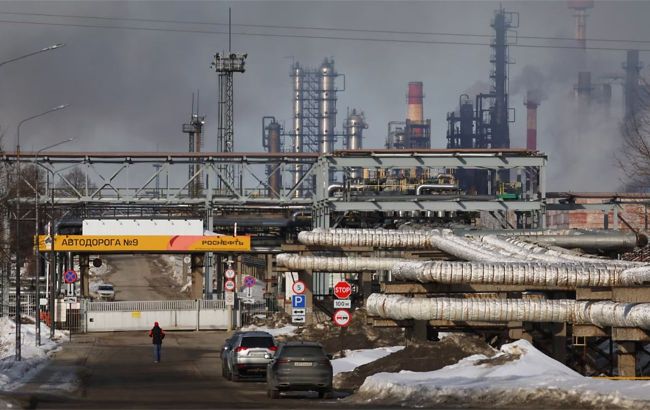US sanctions hinder Russia's refinery repairs - Reuters
 US sanctions hinder Russia's refinery repairs (Russian media)
US sanctions hinder Russia's refinery repairs (Russian media)
Russian oil companies are facing difficulties repairing oil refineries built with the help of American and European engineering companies, reports Reuters.
According to sources in the industry, the problems are exacerbated by Ukrainian drone attacks, which have struck at least a dozen Russian refineries this year. According to Reuters' calculations, these attacks forced Russian refineries to shut down about 14% of their capacity in the first quarter.
"If the stream of drones continues at this rate and Russian air defenses don't improve, Ukraine will be able to cut Russian refining runs quicker than Russian firms will be able to repair them," said Sergey Vakulenko, an expert on Russia's energy industry and non-resident fellow at the Carnegie Endowment for International Peace, an international affairs think tank.
Russian Energy Minister Nikolai Shulginov stated that all refineries would be repaired by June but did not provide details.
The United States and its allies imposed sanctions on thousands of Russian companies after the invasion of Ukraine, while about 1,000 companies announced their exit from the country.
War of attrition
According to more than ten Russian industry sources, Western companies such as UOP and the Swiss engineering group ABB have supplied technologies and software to all 40 of Russia's largest oil refineries over the past two decades. Each refinery has a combination of Russian and foreign equipment.
ABB confirmed to Reuters that it stopped accepting new orders in Russia after the full-scale war began in February 2022 and does not plan to return to Russia after fulfilling contractual obligations.
UOP, a multinational oil engineering company, left Russia after the country invaded Ukraine in February 2022.
Like in the United States, gasoline prices in Russia are a politically sensitive issue, and the government is trying to limit price increases. Recent measures included a ban on gasoline exports for six months starting in February.
Ukraine says it is attacking Russian refineries to undermine the Kremlin's military machine, reducing state revenues and fuel supplies to the army.
"Drones are tens, if not hundreds of times cheaper than the cost of repairs, which is important in a war of attrition," said Vakulenko, who was a former head of strategy at Russian energy major Gazprom Neft. He left the company and Russia a few days after the war against Ukraine began.
Refinery issues
Russia is the world's second-largest oil exporter. After Western countries imposed sanctions on Moscow, it redirected most of its oil and petroleum product exports to Asia and Africa.
If Moscow faces a sharp reduction in oil processing volumes, it will be forced to reduce fuel exports in favor of crude oil, according to over 10 Russian oil traders.
Russia supplies oil to only a few major buyers, such as China, India, and Türkiye, but its fuel customer portfolio is relatively broader, as it can supply oil to smaller consumers in Africa and South America.
Russia's oil refining industry began in the 1940s when the United States supplied equipment under the lend-lease program during World War II.
After the collapse of the Soviet Union, Russian oil companies invested tens of billions of dollars in modernization with companies like UOP and ABB.
The United States imposed sanctions on companies worldwide, including in Türkiye, to prevent the transfer of technology to Russia.
Countries under Western sanctions, like Russia and Iran, have long found ways to obtain spare parts for Western-made equipment, such as planes or cars.
However, refinery equipment is much rarer and more specialized. Western firms have tightened checks to prevent Russia from importing spare parts through third countries, according to one of five sources.
Hits on refineries
At the end of March, the Financial Times reported that the US urged Ukraine to stop attacks on Russian energy infrastructure. Washington fears that strikes on Russian refineries could lead to higher global oil and gasoline prices.
However, attacks on Russian refineries continued. On April 2, Ukraine launched a massive drone strike on Russian territory. The third-largest Russian refinery and the production of Shahed drones were damaged in Tatarstan.

